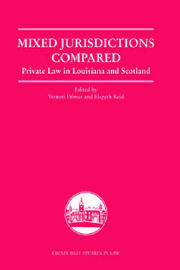Book contents
- Frontmatter
- Contents
- Preface
- List of Contributors
- List of Abbreviations
- Table of Cases
- 1 Praedial Servitudes
- 2 Title Conditions in Restraint of Trade
- 3 Servitudes: Extinction by Non-Use
- 4 Inheritance and the Surviving Spouse
- 5 Ownership of Trust Property in Scotland and Louisiana
- 6 The Legal Regulation of Adult Domestic Relationships
- 7 Impediments to Marriage in Scotland and Louisiana: An Historical-Comparative Investigation
- 8 Contracts of Intellectual Gratification – A Louisiana-Scotland Creation
- 9 The Effect of Unexpected Circumstances on Contracts in Scots and Louisiana Law
- 10 Hunting Promissory Estoppel
- 11 Unjustified Enrichment, Subsidiarity and Contract
- 12 Causation as an Element of Delict/Tort in Scots and Louisiana Law
- 13 Personality Rights: A Study in Difference
- Index
8 - Contracts of Intellectual Gratification – A Louisiana-Scotland Creation
Published online by Cambridge University Press: 12 September 2012
- Frontmatter
- Contents
- Preface
- List of Contributors
- List of Abbreviations
- Table of Cases
- 1 Praedial Servitudes
- 2 Title Conditions in Restraint of Trade
- 3 Servitudes: Extinction by Non-Use
- 4 Inheritance and the Surviving Spouse
- 5 Ownership of Trust Property in Scotland and Louisiana
- 6 The Legal Regulation of Adult Domestic Relationships
- 7 Impediments to Marriage in Scotland and Louisiana: An Historical-Comparative Investigation
- 8 Contracts of Intellectual Gratification – A Louisiana-Scotland Creation
- 9 The Effect of Unexpected Circumstances on Contracts in Scots and Louisiana Law
- 10 Hunting Promissory Estoppel
- 11 Unjustified Enrichment, Subsidiarity and Contract
- 12 Causation as an Element of Delict/Tort in Scots and Louisiana Law
- 13 Personality Rights: A Study in Difference
- Index
Summary
INTRODUCTION
Numerically at least, the impersonal trades and barters of the marketplace constitute the majority of our contracts. In these we primarily seek lucrative ends and the satisfaction of basic needs. They no doubt affect our pocket-books more than our minds, though those worlds are never wholly separate. There is, however, a different type of contract that directly envisions the advancement and development of an individual's personality interests. Here the salient reason for contracting is to obtain an intangible nonpecuniary asset that enriches our lives in some way, whether it be peace of mind, intellectual pleasures, peer recognition or perhaps social standing. Such contracts are in effect vessels of self-expression and self-realisation, as when a young artist's works will be exhibited by a prestigious museum, or a music lover obtains a ticket to hear a renowned artist, or a philanthropist buys an historic property to preserve it from demolition, or a person makes pious donations to comply with a sense of religious duty or inner conscience. Of course contracts primarily affecting the personality need not always seem noble and high-minded. A great number of them are simply embedded in daily life, our calendar, our rites of passage, and so forth. Thus our weddings, burials, graduations, vacations, philanthropy, schooling, seasonal diversions, and reunions are intensely personal and important events in which a host of crucial services and suppliers are involved behind the scenes (caterers, photographers, funeral directors and so forth).
- Type
- Chapter
- Information
- Mixed Jurisdictions ComparedPrivate Law in Louisiana and Scotland, pp. 208 - 243Publisher: Edinburgh University PressPrint publication year: 2009



